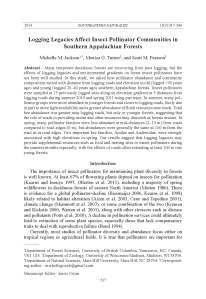Insect pollinators are critical for maintaining forest plant diversity. Close to 70% of our flowering plants are pollinated by insects, including most of our spring wildflowers. However, research suggests significant pollinator decline throughout the U.S., likely due to native habitat destruction and climate change. Interestingly, Southeastern Naturalist just published a new research paper that found that the logging roads and other openings that remain after a tree harvest in fact benefit insect pollinators.
Timber Management is a key component of the Grandfather Restoration Project, and selective tree harvest is a valuable management tool used to restore native plant and animal communities. The National Forests of the Southern Appalachians were once a significant source for wood products throughout the nation. Once virgin timber was harvested, many areas were replanted with trees that were the most commercially valuable. Eastern White Pine (Pinus strobus) was chosen as it is one of the most economically valuable trees due to its myriad of uses, longevity following harvest, rapid growth, and relatively few defects. Many areas of the Grandfather Ranger District are now dominated by densely planted white pine plantations, but the density of such stands prevents sunlight from reaching the forest floor, which inhibits the growth of herbaceous plants and ultimately limits plant and animal diversity.
Over the past 50 years, the priorities of the US Forest Service have shifted. In general, the focus of our National Forest timber management programs are no longer solely for fiber production. As rapid urban development continues throughout the southeastern US, our native plant and animal communities are disappearing and the US Forest Service recognizes this. Fortunately, they also understand that the forests they manage are crucial for the preservation of biodiversity in our country. Although some past harvest practices have, justifiably, made many of us wary due to the environmental damage that can result, research over that past 30 years has demonstrated that well-planned timber management is an effective means of restoring our native plant and animal communities, including insect pollinators:
“Many temperate deciduous forests are recovering from past logging, but the effects of logging legacies and environmental gradients on forest insect pollinators have not been well-studied. In this study, we asked how pollinator abundance and community composition varied with distance from logging roads and elevation in old (logged >90 years ago) and young (logged 20–40 years ago) southern Appalachian forests. In summer, many pollinator groups were more abundant in younger forests and closer to logging roads, likely due in part to more light availability and a greater abundance of floral resources near roads. Total bee abundance was greater near logging roads, but only in younger forests, suggesting that the role of roads in providing nectar and other resources may diminish as forests mature. In spring, many pollinator families were less abundant at mid-distances (2–10 m) from roads compared to road edges (0 m), but abundances were generally the same at 100 m from the road as at road edges. Two important bee families, Apidae and Andrenidae, were strongly associated with high elevations in spring. Our results suggest that logging legacies may provide supplemental resources such as food and nesting sites to insect pollinators during the summer months especially, with the effects of roads often extending at least 100 m into young forests.”
So the next time you find yourself driving, biking, or hiking through the Grandfather Ranger District and come across a timber harvest, realize that although it may look somewhat unappealing in the beginning this work will not only benefit our natural communities over the long-term, but according to this research, it benefits insect pollinators in the short-term.
Access the full article: